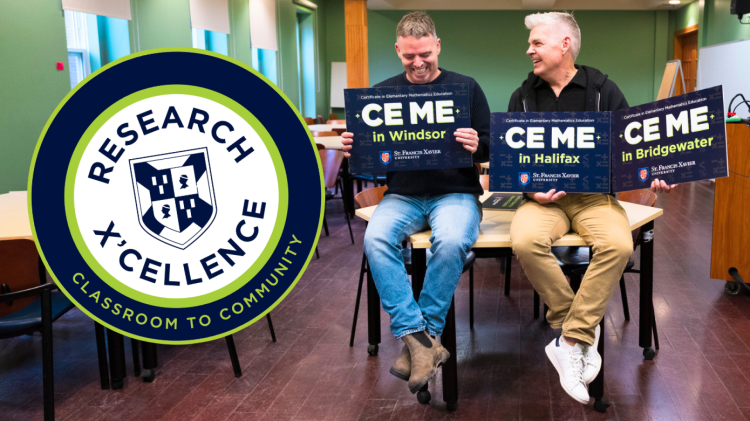Research X'cellence: Our StFX community levering expertise on today's most pressing challenges. At StFX, innovative research and creative activity are benefiting our communities, addressing some of today's most pressing challenges. Research X'cellence shines a spotlight on members of our inspiring educational community and the impact they're making. (To see the full series, please click HERE.)

L-r, Dr. Marc Husband and Dr. Evan Throop-Robinson
Putting the joy in mathematics: StFX researchers enhancing mathematical experiences for learners
Dr. Marc Husband and Dr. Evan Throop-Robinson are on a mission. They want elementary school students to see they can do mathematics. And to experience the joy of mathematical ideas.
The two StFX education professors, who both spent years as classroom teachers before completing graduate studies, have focused their research efforts on addressing a significant societal concern regarding children's proficiency in basic mathematics, particularly in the recent decline in PISA scores across Canada.
"We have a whole bunch of people who don't see themselves as math people," says Dr. Husband.
This is part of the problem, says Dr. Throop-Robinson.
He often hears people comment, "Math is for people who can do it, not me."
The two StFX faculty want to address this perception problem and to help ease math anxiety for people who've had poor experiences with the subject. They're working with teachers and with young learners to reframe student perceptions around mathematics, including in the way it is communicated.
MENTAL MATH
Part of this research includes looking into the classroom practice of Number Talks. Number Talks are brief and regular group discussions about mental math strategies. Number Talks can provide students with visualizations that break apart and put numbers back together so they can grow their understanding.
Dr. Throop-Robinson and Dr. Husband are particularly interested in mental math and the images formed in one's mind as they work through calculations and start to understand the fuller picture.
"We want to help learners develop mental math and help them communicate the strategies and what they see in their mind. As they build those mental images, mental math becomes more accessible, there is an ease to it," Dr. Throop-Robinson says.
"We're building learners' flexibility with numbers."
Rather than seeing math just as rules to follow, Dr. Husband says they're trying to relate how math can be approached and look very different for a whole bunch of people. They want to focus on students' mathematical thinking which is fascinating and creative.
"In traditional classrooms, a teacher often shows and tells learners how to do it, and then you would do it. It was if you copy my method, you'll be okay.' What we're doing is trying to elicit strategies from students and make them visible for public discussion. Math is about ideas."
CONFIDENCE BUILIDNG
Number Talks are a way to shift discourse in classrooms, where the focus shifts from whether an answer is right or wrong to how did you get to the answer.
"The research studies we've designed are addressing those issues. As a result of this, students and teachers are more able to see that their ideas are valued and they see themselves in those ideas, which helps lessen anxiety," Dr. Husband says.
"It's confidence building," Dr. Throop-Robinson adds.
The two researchers, who've published extensively on the subject in Canadian and international journals and worked alongside teachers in professional development settings, say they've had teachers tell them that they've never felt quite comfortable in math, but this reframing has started to build their confidence.
The teachers say they see newfound joy in the subject, and the joy in the eyes of their students.
This research is also quite distinct in that it is classroom-based. Beyond reading the literature, the researchers wanted to know what this looks, feels, and sounds like in the classroom.
"Let's go into Nova Scotia classrooms," Dr. Throop-Robinson says on their thinking to collaborate with teachers, to collect data, and to use the voice of the classroom to inform their research. Dr. Husband says this is cyclical, "Research informs practice and practice informs research."
And it's not just elementary school classrooms. Their work extends to StFX, into B.Ed. classrooms as well as the professional Certificate in Elementary Mathematics Education program.
NEW GENERATION IN MATH
They're hopeful the research might help teachers to grow their practice and help young people to see themselves as math people.
"Our hope is to see a new generation of students growing up seeing themselves in math," Dr. Throop-Robinson says.
"Math has been called a gatekeeper, in that it keeps people from going places. We think that's artificial."
This is a subject we can all do, Dr. Husband says.
They're excited about working to change the perception problem and to have more people feel confident in their math skills.
"Math is part of how we live our lives and so many people describe themselves as not a math person,'" Dr. Throop-Robinson says.
"If we could keep those doors open for more people, there might be more opportunities for them."












